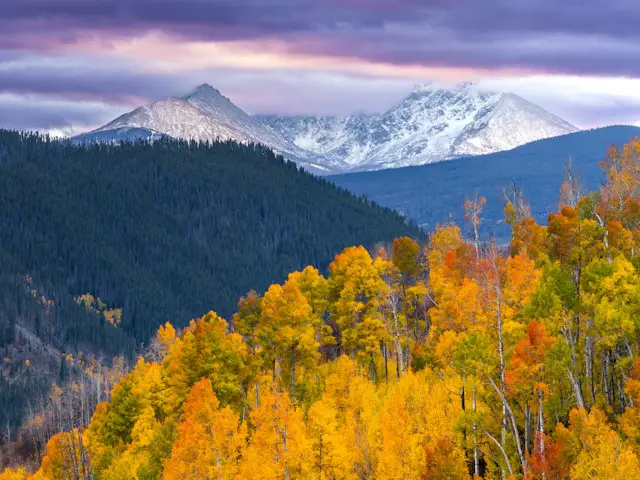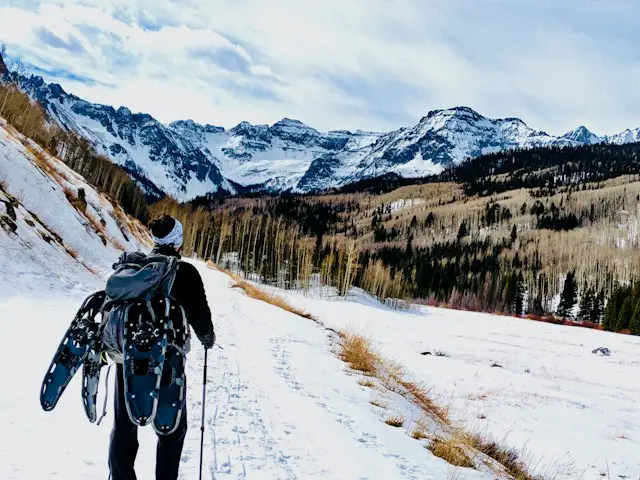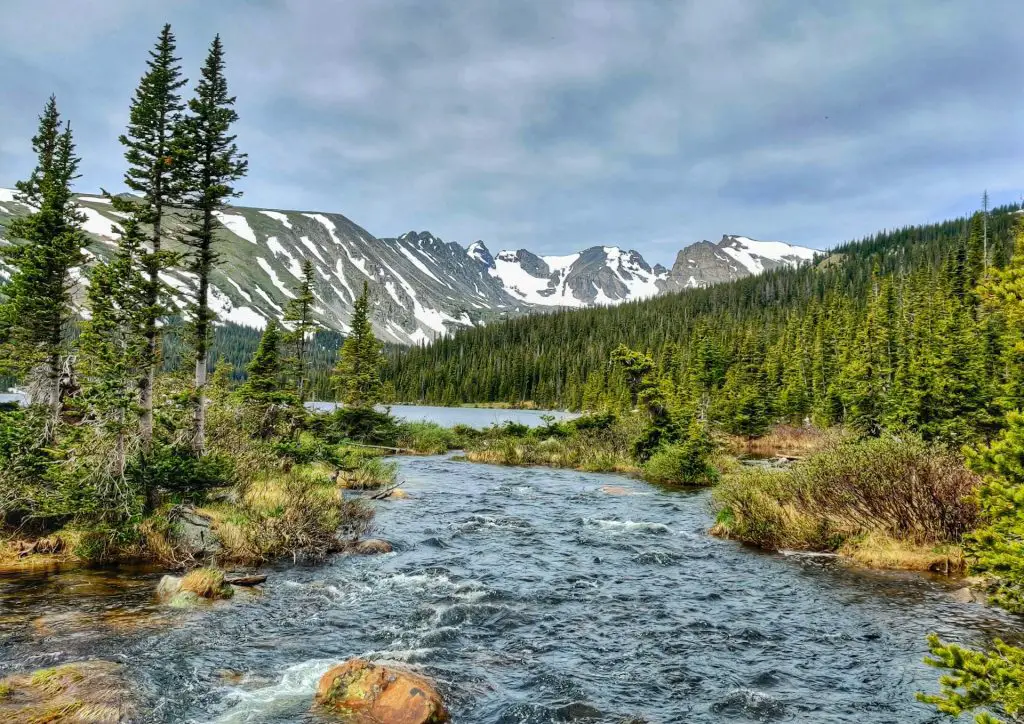Colorado, often referred to as the “Centennial State,” is a true haven for outdoor enthusiasts and nature lovers. With its majestic Rocky Mountains dominating the landscape, Colorado offers a plethora of stunning peaks to explore and enjoy. Whether you’re an avid hiker, a skier, or simply seeking breathtaking views, Colorado’s mountains have something for everyone. In this article, we’ll explore the 12 best Colorado mountains to visit for an unforgettable experience in the great outdoors.
Mount Elbert:
As Colorado’s highest peak, Mount Elbert stands tall at 14,440 feet (4,401 meters). Hiking to its summit is a challenging yet rewarding endeavor, offering panoramic views of the Sawatch Range and the surrounding wilderness.
Pikes Peak:
Known as “America’s Mountain,” Pikes Peak looms over Colorado Springs. You can drive or hike to its 14,115-foot (4,302-meter) summit, where you’ll be treated to breathtaking vistas that inspired the famous words of Katharine Lee Bates, “America the Beautiful.”
Longs Peak:
Located in Rocky Mountain National Park, Longs Peak is a popular destination for experienced hikers and mountaineers. Its elevation of 14,259 feet (4,346 meters) challenges adventurers with a thrilling climb and stunning vistas.
Maroon Bells:

Often considered Colorado’s most photographed peaks, the Maroon Bells are twin 14,000-foot (4,267-meter) summits located in the Elk Mountains near Aspen. The Maroon Lake reflects these majestic peaks, creating a picture-perfect setting.
Mount Evans:
Accessible by the highest paved road in North America, Mount Evans offers visitors an easy drive to its 14,264-foot (4,349-meter) summit. The views from the top are spectacular, and you may even spot mountain goats and bighorn sheep.
Crestone Needle and Crestone Peak:
The Crestone Needle and Crestone Peak are two prominent 14ers in the Sangre de Cristo Range. These peaks provide challenging ascents with rewarding views of the San Luis Valley.
Quandary Peak:
As one of Colorado’s most accessible 14ers, Quandary Peak is ideal for those new to high-altitude hiking. The trailhead is near Breckenridge, making it a popular choice for visitors to the area.
Grays and Torreys Peaks:
These twin peaks are often climbed together due to their close proximity. Grays Peak stands at 14,270 feet (4,350 meters), while Torreys Peak reaches 14,267 feet (4,349 meters). Both offer relatively moderate hikes with stunning views.
Mount of the Holy Cross:

Known for its distinctive cross-shaped snowfield, Mount of the Holy Cross is a 14er located in the Sawatch Range. It’s a challenging climb but rewards adventurers with a unique natural feature.
La Plata Peak:
Situated near Leadville, La Plata Peak is one of Colorado’s highest 14ers. The hike to its summit includes lush forests, alpine meadows, and breathtaking views of the surrounding valleys.
Capitol Peak:
For experienced climbers looking for a challenging adventure, Capitol Peak in the Elk Mountains is a thrilling choice. Its knife-edge ridge and exposed terrain make it a true mountaineering challenge.
Mount Sneffels:

Located in the San Juan Mountains near Ouray, Mount Sneffels offers stunning alpine scenery and an excellent hiking experience. The hike to its summit is both challenging and rewarding.
Colorado’s mountains offer a diverse range of experiences for outdoor enthusiasts, from challenging climbs to scenic drives. Whether you’re a seasoned mountaineer or a casual hiker, these 12 best Colorado mountains promise awe-inspiring natural beauty and unforgettable memories. So, pack your hiking boots, breathe in the fresh mountain air, and explore the Centennial State’s majestic peaks.
Tips for Visiting Colorado’s Mountains:
Be Prepared: Colorado’s high-altitude mountains can present challenging weather conditions, even in the summer. Be prepared for sudden changes in weather, and always check the forecast before your trip.
Acclimatize: If you’re visiting from lower elevations, take time to acclimatize to the altitude before attempting high-altitude hikes. This will help prevent altitude sickness.
Stay Hydrated: At higher elevations, you’ll lose moisture faster through respiration. Carry plenty of water and stay hydrated throughout your adventure.
Leave No Trace: Practice Leave No Trace principles to preserve the natural beauty of Colorado’s mountains. Pack out all trash, stay on designated trails, and respect the environment.
Plan Ahead: Some hikes require permits or have limited access, so plan your trip in advance. Check for trail closures, fire bans, and any other relevant information before heading out.
Safety First: If you’re attempting a challenging climb or hike, consider hiring a local guide or climbing with an experienced group. Safety should always be a top priority.
Wildlife Awareness: Colorado’s mountains are home to diverse wildlife, including bears, moose, and mountain lions. Learn how to coexist with these animals safely by following proper wildlife etiquette.
Trail Etiquette: Be courteous to fellow hikers and share the trail. Yield the right of way to uphill hikers, and keep noise levels to a minimum to avoid disturbing the peaceful mountain environment.
Camping Regulations: If you plan to camp in the mountains, make sure you’re aware of camping regulations and obtain any necessary permits. Respect campfire restrictions to prevent wildfires.
Respect Local Communities: When visiting mountain towns and communities, be respectful of local customs, businesses, and residents. Support the local economy by dining and shopping locally.
In conclusion, Colorado’s mountains are a treasure trove of natural beauty and outdoor adventures waiting to be explored. Whether you’re a thrill-seeker aiming for challenging summits or a nature lover seeking serenity, there’s a Colorado mountain that will cater to your desires. Just remember to be prepared, stay safe, and leave only footprints as you embark on your mountain adventure in the picturesque Centennial State.
Beyond the stunning natural beauty and outdoor activities, Colorado’s mountains also offer unique cultural experiences and opportunities for relaxation. Here are a few additional recommendations for making the most of your mountain visit:
Explore Mountain Towns:
Colorado’s mountain towns are charming and filled with character. Towns like Aspen, Breckenridge, Telluride, and Vail offer not only exceptional dining and shopping but also a rich cultural scene with art galleries, festivals, and historic landmarks.
Soak in Hot Springs:
Colorado is dotted with natural hot springs, providing a perfect way to unwind after a day of outdoor adventures. Consider visiting hot springs resorts like Glenwood Springs, Ouray, or Pagosa Springs for a rejuvenating soak amidst stunning mountain scenery.
Experience Seasonal Activities:
The mountains offer a wide range of activities year-round. In the winter, enjoy world-class skiing and snowboarding, while summer brings opportunities for mountain biking, rock climbing, and white-water rafting.
Go Wildlife Watching:
Colorado’s mountains are teeming with wildlife, from elk and deer to eagles and marmots. Bring your binoculars and camera to capture the beauty of these creatures in their natural habitats.
Stargazing:
The clear mountain skies are perfect for stargazing. Consider bringing a telescope or simply lie back and enjoy the breathtaking display of stars and constellations that illuminate the night sky.
Attend Local Events:
Check the local event calendars for mountain communities during your visit. These towns often host music festivals, craft fairs, and cultural events that showcase the unique character of each place.
Embrace the Culinary Scene:
Colorado’s mountain towns offer diverse culinary experiences. Try locally sourced cuisine, craft beers, and mountain-inspired dishes for a taste of the region’s flavors.
Visit Historic Sites:
Explore the history of Colorado’s mountain regions by visiting historical sites, ghost towns, and mining relics. These sites provide insight into the state’s rich heritage.
Connect with Nature:
Take time to simply be in nature. Whether it’s a leisurely walk through a mountain meadow or sitting by a serene alpine lake, connecting with the natural world can be a deeply enriching experience.
Capture Memories:
Don’t forget to bring your camera or smartphone to capture the stunning landscapes and moments during your mountain visit. These memories will last a lifetime and serve as a reminder of your Colorado adventure.
In conclusion, visiting Colorado’s mountains offers a multitude of experiences, from outdoor adventures to cultural discoveries and moments of serenity. Whether you’re an adrenaline junkie or seeking a peaceful escape, the Centennial State’s mountains have something for everyone. So, plan your trip, explore the Rockies, and create memories that will last a lifetime in the heart of Colorado’s majestic mountains.







